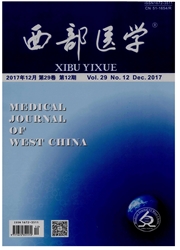

 中文摘要:
中文摘要:
目的探讨流式细胞免疫表型分析(FCI)在实体组织中诊断淋巴组织增生性病变的应用价值。方法采用流式细胞术对261例淋巴组织增生性病变行免疫表型分析,并与病理活检结果进行对比。结果流式细胞免疫表型分析免疫表型分析与病理活检结果比较,差异无统计学意义(P〉0.05)。通过流式细胞术诊断非霍奇金淋巴瘤119例,其中B细胞淋巴瘤70例,T细胞淋巴瘤16例,浆细胞肿瘤4例,NK细胞淋巴瘤21例,前体淋巴造血组织肿瘤8例。B细胞淋巴瘤中,以弥漫大B细胞淋巴瘤为多见;T细胞淋巴瘤中,以血管免疫母细胞性T细胞淋巴瘤为多见。FCI与常规病理活检有19例结果不一致。结论本研究结果提示FCI是淋巴组织增生性痛变病理诊断的重要辅助手段,可提高诊断的准确性,并可缩短确诊时间,值得推广应用。
 英文摘要:
英文摘要:
Objective To investigate the value of flow cytometric immunophenotyping (FCI) in the diagnosis of lymphoid tissue proliferative disorders. Methods We used FCI to analyze 261 cases of lymphoid tissue proliferative disorders, and compared with the result of pathological biopsies. Result There was no statistically difference between FCI and pathological biopsy in diagnosis of lymphoid tissue proliferative disorders. 119 non-Hodgkin lymphoma(NHL) were diagnosed by FCI, including 70 cases of B cell lymphoma, 16 cases of T cell lymphoma, 4 cases of plasma cell neoplasms, 21 cases of NK cell lymphoma, and 8 cases of precursor lymphatic hematopoietic tissue tumors. Diffuse large B cell lym- phoma was the common type in B cell lymphoma and angioimmunoblastic T-cell lymphoma was the common type in T cell lymphoma. There were 19 inconsistent cases between FCI and the routine pathological biopsy results. Conclusion This study results suggest that FCI is a very important auxiliary method for diagnosis of lymphoid tissue proliferative disorders, which can improve the accuracy of diagnosis and shorten the diagnostic time. FCI is worthy of application in diagnosis of lymphoid tissue proliferative disorders.
 同期刊论文项目
同期刊论文项目
 同项目期刊论文
同项目期刊论文
 Hepatosplenic T-cell lymphoma: clinicopathologic, immunophenotypic, and molecular characterization o
Hepatosplenic T-cell lymphoma: clinicopathologic, immunophenotypic, and molecular characterization o 期刊信息
期刊信息
